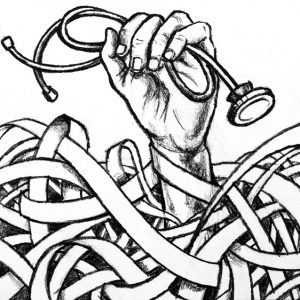by Robert A. Duke
Getting the healthcare you want can be as simple as asking your doctor what’s available. As to prescription (Rx) medications, patients most often search for lower cost options. That sounds simple enough, but it can be difficult to know what the questions are.
An occasional new feature of Whatcom: Chronic & Acute is this first edition of MD Q&A, intended to stimulate discussion between you and your healthcare provider. Your questions can help inform your provider about your concerns and may reveal choices available for your care and treatment.
Asking questions is, I believe, the key to healthcare education and choices. To get you started, below is an opening list of questions, which in themselves alert you to healthcare choices and set you to thinking about your own unique questions.
I recently made a presentation at the Bellingham Senior Activities Center (BSAC) about reducing prescription costs, and I realized that patients need to know how to talk to their doctor and pharmacist, especially what to ask about. Here’s the list of tips and alternatives I provided at my presentation:
Drug pricing: A prescribed over the counter (OTC) medication may be cheaper if a pharmacist hands it to you than if you pick it off the shelf yourself, because the prices are set by separate agencies. Believe it or not, sometimes prescription is cheaper than retail.
Prescription quantity: Quantity usually reduces cost. Ninety pills are generally cheaper per pill than 30, but prescriptions are often for 30 as mandated by your insurance company and your doctor’s habit.
Cutting a pill: Often prescribed drugs are available only in a double-dose pill, which is a cost saver because they are often priced little more than a pill of the correct dosage. And generic drugs are often as effective as name brand drugs but cost less.
Don’t name a single pharmacy to fill all of your Rxs. Either check the price online before leaving the doctor’s office or take a copy of the Rx with you and shop it by phone. PS: Tell your doctor the price of each Rx the next time you see him/her, otherwise they don’t know.
OK Pricing: If you are not pleased about the price of your Rx at your pharmacy have it transferred to another pharmacy or ask another pharmacy to get it transferred for you. Before paying, ask you pharmacist to check his computer for any discounts you may be eligible for. PS: Always dispute the price you are first given.
Co-pays: The minimum insurance co-pay may be more than the cash cost of some common generic drugs. Ask the pharmacist for the cash cost compared to the co-pay.
Online Ordering: Consider a mail order pharmacy because you are probably already a customer of one through your brick’n’mortar drug store, which is already using one itself for some of your existing Rxs.
Have your pharmacist review your written Rx with you and compare it with your Rx bottle label. Doctors signal pharmacists about handling your Rx by not only what it says but by how it is formatted. You may learn of restrictions or benefits.
Healthcare insurance is so pervasive that many doctors consider insurance requirements as normal and standard practice. If you have no drug insurance, you are at liberty to do things differently. Your doctor seldom knows much if anything about your health insurance, drug or otherwise.
There are at least two types of pharmacies to fill your prescriptions: generic and specialty. Your insurer has negotiated prices with each. The price difference can be enormous for a generic drug from a specialty pharmacy and vice versa.
For specialty drugs, try to get the Rx filled for the exact dosage. Many specialty drugs (such as for cancer treatment) are pre-packaged in a form that forces the patient to pay for a higher dosage than prescribed. Don’t believe it if you are told it’s impossible, because it’s not.
There are stealthy insurance organizations monitoring every pill in every Rx you are taking and determining when you can get a refill, by the number of pills remaining from the 30 they authorized. I call them “stealth” because they are often inaccessible to patients and their role in your healthcare may not be obvious. The one I’m most familiar with is MedImpact.
Probably no other aspect of healthcare changes as often and dramatically as does pharmacy. Nor is any aspect of healthcare, in my opinion, as complex and more affected by huge corporations and bureaucracies, than prescription drugs. Evidently it is highly lucrative: big pharma, big retail drug stores, big insurers, big government and, of course, big money. Recently Amazon and United Parcel Service (UPS) announced they are entering the drug business. One way or another, the pharmaceutical business is in the news daily from price gouging to run-away costs to new services. Watch out!
Talk to your doctor and pharmacist about these suggestions and ask a lot of questions. There’s a lot going on and a lot to learn.
_________________________________
Robert A. Duke is author of “Waking Up Dying: Caregiving When There Is No Tomorrow,” he lives in Bellingham. His email: boshduke@gmail.com





























